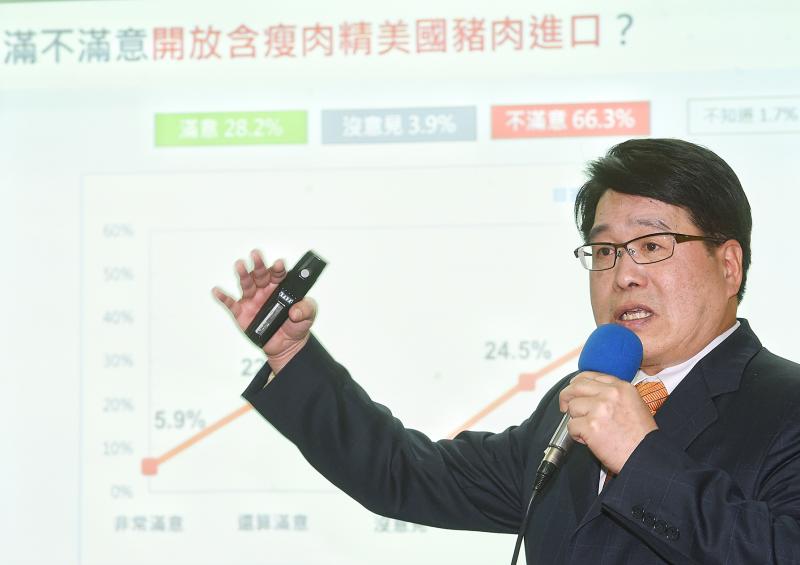The majority of people oppose imports of US meat containing ractopamine, but remain optimistic about Taiwan-US relations, survey results released yesterday by the Taiwanese Public Opinion Foundation found.
Foundation chairman Michael You (游盈隆) designed the questions, and commissioned Focus Survey Research to conduct the survey by telephone.
Respondents were asked about a variety of major issues, which also included Taiwan-China relations, and public approval of the president and premier.

Photo: Liu Hsin-de, Taipei Times
Of the respondents, 66.3 percent opposed imports of meat products containing ractopamine, while 28.2 percent approved, the foundation said.
However, the survey found that 60 percent of Democratic Progressive Party supporters approved of the imports, while 32 percent did not.
Among Chinese Nationalist Party (KMT) supporters, only 2.4 percent approved of the imports, and 97 percent opposed them.
Among the Taiwan People’s Party supporters who were surveyed, 15 percent approved of the imports and 85 percent disapproved, while 12 percent of New Power Party supporters approved and 79 percent disapproved.
Among those who had no political affiliation, 19 percent of respondents approved of the imports, while 74 percent opposed them.
The survey also found that 54.3 percent of respondents supported a referendum drive initiated by KMT lawmakers to reinstitute a ban on meat products containing ractopamine, while 36.1 percent did not.
Nearly all of the respondents aged 65 or under were in support of the referendum, while half of those above the age of 65 backed it, the foundation said.
Of the respondents, 51.3 percent said that they approved of how President Tsai Ing-wen (蔡英文) was dealing with major issues, while 37.4 percent said that they did not.
Regarding Premier Su Tseng-chang’s (蘇貞昌) overall performance, 52.3 percent said that they were happy with it, while 41.7 percent were dissatisfied.
Sixty-five percent of respondents said that they were not concerned that the relationship between Taiwan and the US would regress following the inauguration of US President Joe Biden, while 28 percent said they had such concerns.
On the issue of whether authorities should strive for Taiwan’s inclusion in the UN, 79 percent said that they should, while 15 percent said they should not.
Meanwhile, 67 percent of the respondents said they disagreed that the Taiwan-China relationship was more important than Taiwan’s relations with other countries, while 26 percent said that it was.
Of the 67 percent, 37 percent said that they “strongly disagreed,” while of the 26 percent, 12 percent “strongly agreed.”
Half of respondents supported formal Taiwanese independence, while 14 percent said that they hoped Taiwan would eventually be unified with China, and 25 percent hoped that the “status quo” would be maintained.
The survey, conducted on Monday and Tuesday last week, collected 1,081 valid questionnaires and had a margin of error of 2.98 percentage points.

UNILATERAL MOVES: Officials have raised concerns that Beijing could try to exert economic control over Kinmen in a key development plan next year The Civil Aviation Administration (CAA) yesterday said that China has so far failed to provide any information about a new airport expected to open next year that is less than 10km from a Taiwanese airport, raising flight safety concerns. Xiamen Xiangan International Airport is only about 3km at its closest point from the islands in Kinmen County — the scene of on-off fighting during the Cold War — and construction work can be seen and heard clearly from the Taiwan side. In a written statement sent to Reuters, the CAA said that airports close to each other need detailed advanced

Tropical Storm Fung-Wong would likely strengthen into a typhoon later today as it continues moving westward across the Pacific before heading in Taiwan’s direction next week, the Central Weather Administration (CWA) said. As of 8am, Fung-Wong was about 2,190km east-southeast of Cape Oluanpi (鵝鑾鼻), Taiwan’s southernmost point, moving westward at 25kph and possibly accelerating to 31kph, CWA data showed. The tropical storm is currently over waters east of the Philippines and still far from Taiwan, CWA forecaster Tseng Chao-cheng (曾昭誠) said, adding that it could likely strengthen into a typhoon later in the day. It is forecast to reach the South China Sea

Almost a quarter of volunteer soldiers who signed up from 2021 to last year have sought early discharge, the Legislative Yuan’s Budget Center said in a report. The report said that 12,884 of 52,674 people who volunteered in the period had sought an early exit from the military, returning NT$895.96 million (US$28.86 million) to the government. In 2021, there was a 105.34 percent rise in the volunteer recruitment rate, but the number has steadily declined since then, missing recruitment targets, the Chinese-language United Daily News said, citing the report. In 2021, only 521 volunteers dropped out of the military, the report said, citing

WEATHER Typhoon forming: CWA A tropical depression is expected to form into a typhoon as early as today, the Central Weather Administration (CWA) said yesterday, adding that the storm’s path remains uncertain. Before the weekend, it would move toward the Philippines, the agency said. Some time around Monday next week, it might reach a turning point, either veering north toward waters east of Taiwan or continuing westward across the Philippines, the CWA said. Meanwhile, the eye of Typhoon Kalmaegi was 1,310km south-southeast of Oluanpi (鵝鑾鼻), Taiwan’s southernmost point, as of 2am yesterday, it said. The storm is forecast to move through central